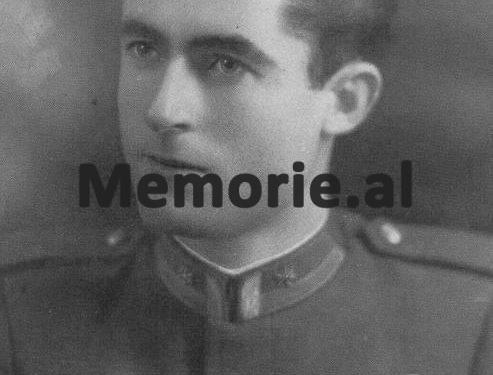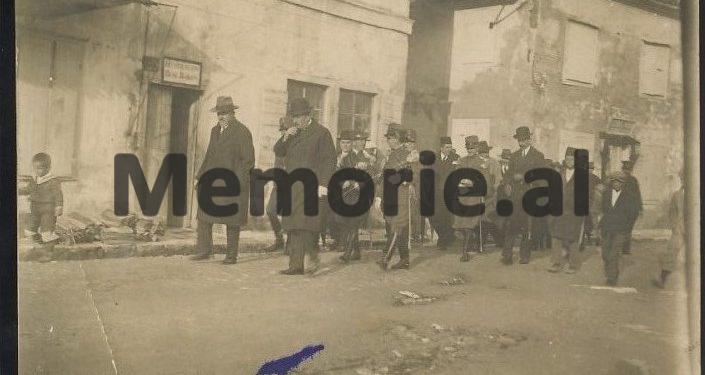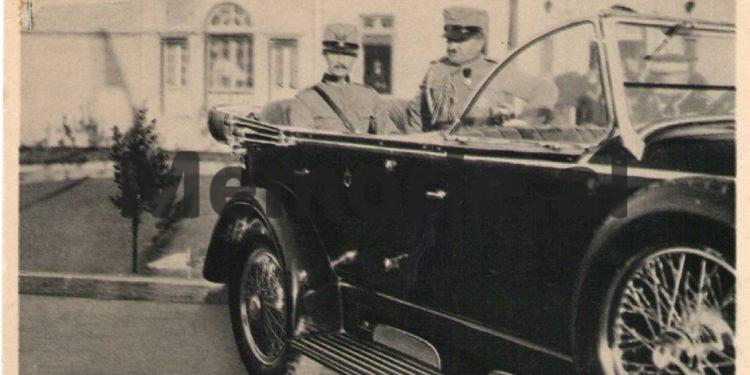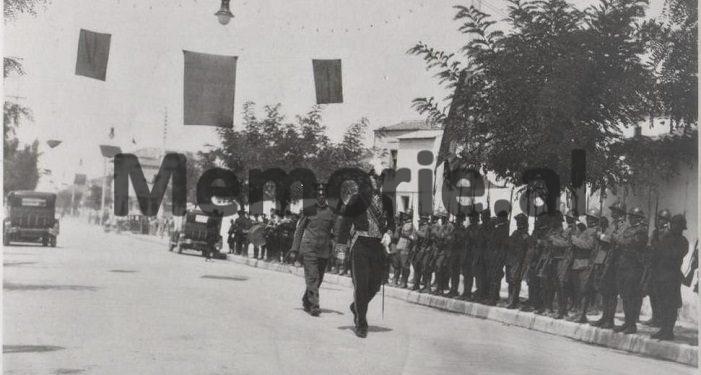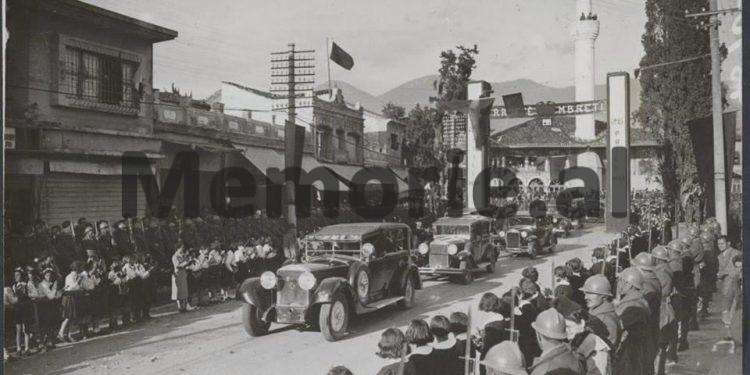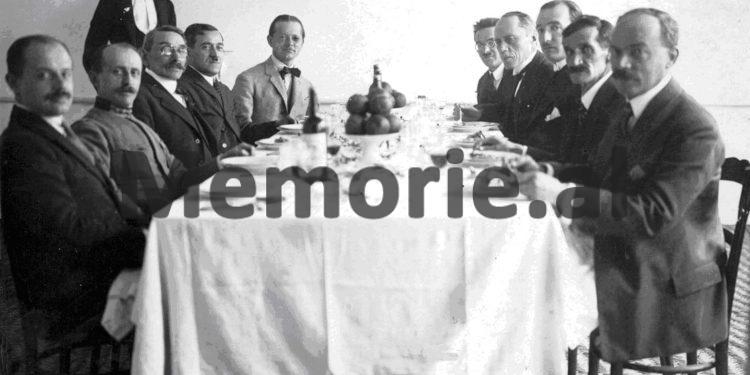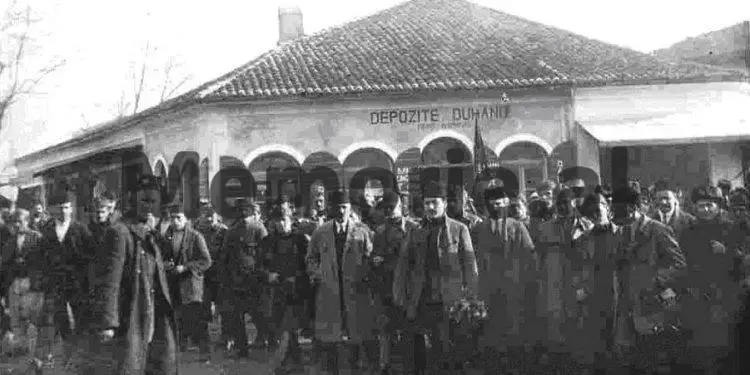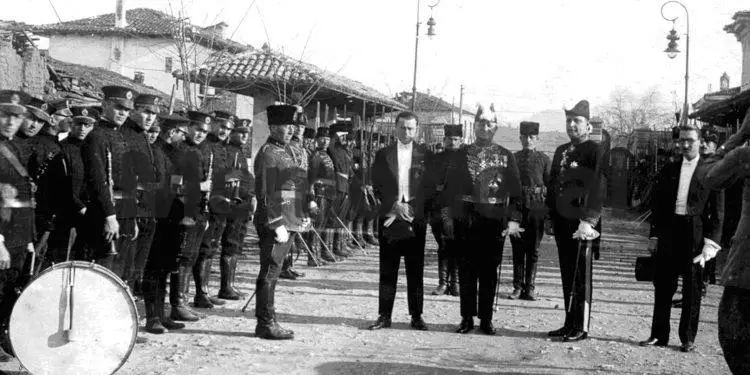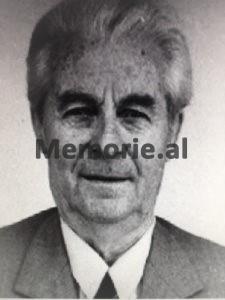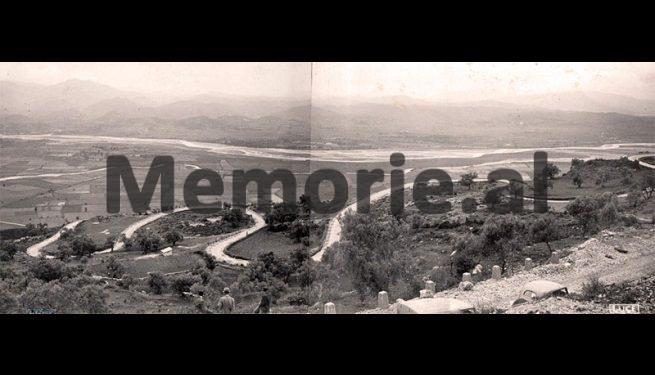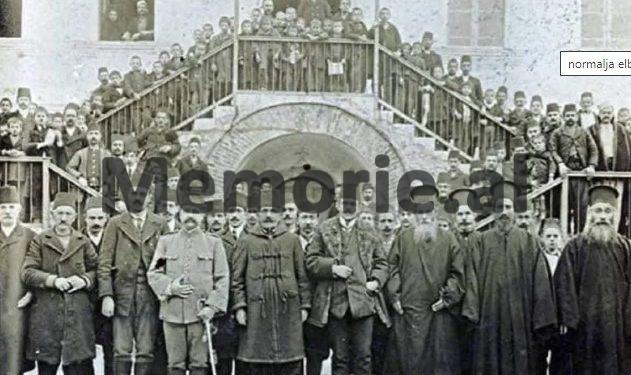Dashnor Kaloçi
Memorie.al publishes the unknown story of the students of the “Normale” school of Elbasan, who in the first days of April 1939, when the fascist Italy of Benito Mussolini was preparing the military aggression against Albania, took to the streets of the city, protesting and seeking weapons to go to Durrës and fight against the invading forces. The rare testimony of the retired former colonel, Myftar Tare, originally from Cologne, who from 1945 to 1949 served as Deputy Minister of Internal Affairs in the department headed by Koci Xoxes, acting Director of the State Security for External Intelligence, which narrates all the events of those days with the students of the “Normale” school, where he studied himself, from the protests in the city streets, the blocking with stones of the national road Elbasan – Korça and the Zaranika Bridge , requests for weapons from the Municipality and the Prefecture, stopping the caravan of government vehicles of the Zog Monarchy traveling to Korça, King Zog going to the office of the Prefect of Elbasan where Shefqet Vërlaci then went, their departure from there and the orders information for the administration officials, up to the possession of weapons in the Krasta barracks of the normalists under the direction of Shefqet Peçi, the caretaker of the dormitory that was the horror of the students, etc.
In addition to the armed resistance, even symbolic, of the invading Italian military troops of Benito Mussolini on the distant April 7, 1939 (or as it is otherwise known in the historical memory of the Albanians, Black Friday), as by King Zog’s military units and gendarmerie, as well as from the volunteer forces and various individuals who took up arms and went to fight in those first days of April 1939, there were many powerful demonstrations and protests in some of the main cities of the country. Crowds of irritated people, without and organized, went in front of government offices to ask for weapons, or to register as volunteers waiting to leave in vehicles in the direction of Durres, Vlora, Saranda, Shengjin, etc. Where the landing of Benito Mussolini’s Italian troops was expected for minutes. One of the cities that was involved in the protests was Elbasan, because not only did the national road pass from there, from where government vehicles moved in the direction of Korça and Pogradec, in order to leave Albania, but in that city, there were also boarding students of the “Normale” school, who got up and went out into the city streets, looking for weapons.
Regarding these and other events that took place in the city of Elbasan in the first days of April 1939, we know the testimonies of the retired colonel, Myftar Tare, former MP and Deputy Minister of Internal Affairs in the years 1945-1949, i who was one of the students and organizers of the “Normal” of Elbasan, who came out in mass protests and armed themselves to fight against the fascist occupation.
Mr. Myftar, when did you learn in your school that the invasion of Albania by fascist Italy was being prepared and that Mussolini’s troops would land in the ports of our country?
These words, ie the possibility of landing Italian troops in Albania, had spread and circulated throughout the city since the last days of March. But exactly, that thing was learned in the first days of April, when a great and marching movement was noticed, both by the military and the state administration, senior politicians and ministers of the government of King Zog. This created a great indignation in all the students and professors of our school, because, among other things, at that time in our school there was a strong anti-Zogist spirit.
Why was there an anti-Zogist spirit in the “Normale” school of Elbasan at that time?
In “Normale” in Elbasan in those years there was a strong anti-Zogist spirit, which, among other things, was due to the fact that Avni Rustemi, the famous assassin of Esat Pasha Toptan, had studied there, and years ago in that the school had been headed by Luigj Gurakuqi, who was assassinated in Bari, Italy, and King Zog was directly accused of it. Likewise, the patriotic society “Bashkimi”, which in its first years, was led by Avni Rustemi and the people closest to Fan Noli, was founded and supported by the students of the “Normale” school of Elbasan. But what pushed and made more evident the anti-Zogist spirit in our school, was the work of the communist groups of Korça, Shkodra and the Youth, which had their people and their sympathizers, not only in the ranks of students, but also of our professors… For example, at that time I was a sympathizer of the Communist Group of Korça and together with some other friends from Korça, Kolonja, Pogradec, etc., we had regular contacts with the members of that group, who were specially appointed for this purpose., ie for connections with high school students. All this had caused an anti-Zogist spirit to prevail in the school, which, as I said, had the support of most of our professors.
Who were some of your professors who excelled in the anti-Zogist spirit at the time?
There were many, but I remember and can mention some of them like: Petraq Pepo, Kol Popa, Veniamin Dashi, Ahmet Duhanxhiu, Shyqëri Demiri, Niko Stralla, Myrteza Krasta, Zef Kolombi, Vangjush Miho, Teki Tela, Mustafa Babamusta, Perikli Mborja, Foto Bala, Ali Hashorva, Kol Kamësi etc. Many of these professors of our school did not openly display their anti-Zogist convictions and spirit, as they were not only in danger of being fired, but were threatened with much greater consequences, until their arrest. As in fact it had happened even at the time when Qemal Stafa was arrested, where many of the students and professors of “Normale” had ended up in the dock of the accused.
At that time, Shefqet Peçi was also working in the “Normale” school in Elbasan. What was the role and attitude he held?
Before coming to our school, Shefqet Peçi had been a simple military man and if I am not mistaken with the rank of theater or sergeant. After the Fier Uprising, or later when a group of anti-Zogist soldiers was discovered, which included Bedri Spahiu, Dali Ndreu, etc., Shefqeti was demobilized and expelled from the army, releasing him. After that he could be employed in the “Normale” school of Elbasan, as a dormitory caretaker. In fact, Shefqet Peçi was a convinced anti-Zogist, but we students at the school were very afraid of him, because at that time the belief was created that all the school caretakers were the people of Musa Juka, the Minister of Interior of Zog, who was considered loyal. the greatest of the King.
Let us return to the widespread news that fascist Italy was preparing to invade Albania. What did you do after learning that?
Upon hearing that news, if I am not mistaken there from April 3, we “Normale” students started the protests, first inside the school walls and then in the city streets. During those protests, which in a way were completely spontaneous and without any regular organization, we shouted and chanted various slogans such as: “We want weapons”, “We will go to fight against the enemies of our homeland”, etc. These protests that lasted until late at night, spread through all the main streets of the city of Elbasan, but more strongly they took place in front of the building of the prefecture.
What was the attitude of the state bodies, the prefecture, the municipality and the gendarmerie, towards the protests that you carried out?
Initially, there was no reaction from the prefecture and the municipality, but on April 4, during our protests, we were confronted by the gendarmerie, which had received an order and did not allow us to leave the city, telling us that we were breaking peace and public order. But under our pressure, the gendarmerie withdrew and we marched through the city streets. First, we went and burned the Italian flag that was placed on the balcony of the “Dopo-lavoros” hall, which was frequented by sympathizers of fascism. A day later, on April 5, we went and blocked the Zaranika Bridge, placing beams and large stones there, so that vehicles coming from Tirana with different people going in the direction of Korça Region would not pass.
Why at that time the movements had started from Tirana towards Pogradec and Korça, in order to leave Albania?
It had been a few days since the movement of cars had started, which were crossing the Zaranika Bridge with various people, where senior officials, even members of the Zogu Parliament, were rushing to leave Albania together with the families of tire.
After the blockade of the Zaranika bridge, how did your protests continue?
After blocking the bridge, we went in front of the prefecture and gendarmerie building, looking for weapons, and when we returned to the bridge, we found it unblocked by the gendarmerie forces. This ritual continued almost all those days, when we were looking for weapons to go and fight in Durrës.
Did you contact any of the high local authorities of Elbasan?
On the morning of April 5, a group of students, including me, entered the office of the mayor of Elbasan, Sadik Metra, who was originally from Mati and was known as loyal to King Zog. The Regional Commander of the Gendarmerie, Major Sybi Topulli (originally from Gjirokastra), and the Commander of the “Shkumbini” Battalion, Major Ibrahim Mandija, originally from Shkodra, were also in the office with him.
What did you talk to them about?
Indignant and irritated by the way things were precipitating, we turned to Major Ibrahim Mandija, asking him where the “Shkumbini” Battalion was and why he had not gone with his soldiers to fight in Durrës! He replied: “The battalion has gone to Durrës, one is now leaving and going”. In fact, we did not believe his words, as we had information that the “Shkumbini” Battalion he commanded was stationed along the national road Kërrabë-Qafë Thanë, to protect and ensure the passage of government vehicles led by King Zog. Based on this fact, after learning that news, we left the mayor’s office and decided to go in the direction of Qafë-Kërraba. But before we left for Kërraba, we went to Shefqet Vërlac’s house, to ask him what would happen and to see his attitude, as he was known as an anti-Zogist. Shefqet did not come out at all, as he was afraid that we would kill him, but we got angry, with the surname Lleshanaku (Alush Lleshanaku’s father), who told us: “Shefqet is not at home, he went to Bulgaria”. Even though we knew he had lied to us, we left from there, and on the morning of April 7, 1939, he found us at the Qafë-Kërraba bends, where in places, the soldiers and volunteer forces who had gone there to protect and secure the national road were seen. from where government cars and King Zog were expected to pass.
Where did you go next?
We went to the office of the mayor of Elbasan, Ahmet Dakli, who at that time was known as an ardent patriot. He had been a supporter of Aqif Pasha and had participated in all historical events, such as the raising of the flag in Vlora, the Congress of Lushnja, etc. The city council had gathered in his office, who had called the well-known trader, Xhaf Mehja, telling him to continue supplying the “Normale” dormitory with food items, assuring him that the municipality was responsible for everything. While we were instructed to tell the dormitory students to stay in the dormitories and not let anyone leave for their cities. Meanwhile, the situation was getting worse as we did not allow any car to move towards Korça. Based on this fact, the city was filled with many families leaving Tirana, where many of them were various officials, gendarmes, military, etc. Around 12 noon, the first Italian planes appeared over the city and their movements and flights at low altitudes created a great panic among the people.
What did you do in those moments?
After leaving the municipality, we went back to the building of the Prefecture where the prefect Sadik Metra himself was staying with the commander of the Gendarmerie and that of the “Shkumbini” Battalion. During the conversation with them, where our main request was to be equipped with weapons, the mayor told us: “Go to the barracks of Krasta and after you get weapons, you will wait there until our cars come to pick you up and take you to Durrës “.
Did you go there?
Out of several hundred protesters who had filled the city streets, only 53 boarders, 3 administration members and 4 non-commissioned officers recruiting army depots, lined up under the command of Shefqet Peçi, crossing the city streets to the cheers of thousands of citizens. Arriving at the Krasta barracks, we took a gun and 76 bullets, which were given to us with the signature of the armament officer, Lieutenant Virioni, whose brother, Faruku, was with us. There in Krasta we waited for several hours for the cars to come to pick us up, which never came. Apparently, it was just a trap to take us out of town and put peace there.
What about those hours you stayed there, did you see the government vehicles and King Zog himself passing by?
They passed there by 8:30 pm on the evening of April 7th. The long line of cars appeared in Qafën e Kërraba from their strong lights. King Zog’s car was different from the others, as it had the strongest lights and was the most luxurious. As we were told, it was a special car that Hitler had given to Zog.
Did anyone get in front of the long line of vehicles when they passed there at that moment?
Not only did no one dare to do that, but neither could that action be thought of. As early as 3-4 days ago, the entire national road Tirana-Korça was secured with numerous military and volunteer forces. Based on this fact, after descending from Qafa e Kërraba, the long line of cars entered the city and they stayed there for over an hour.
Why did they stop, what had happened?
At about 22:30 two officers came and told us that the line of cars had stayed for an hour in the city, as King Zog himself had been there, who had gotten off and gone to the prefect’s office, where he had then gone and Shefqet Vërlaci. The three had talked together for over 40 minutes. As those two officers told us, Zog’s message to the Prefect, the commander of the “Shkumbini” Battalion and that of the Gendarmerie, had been this: “Keep working normally.” After that, Zogu and the people who accompanied him continued on their way to Korça. When we went down to the city, we went again to the prefecture, and there we were told, “Now you must leave here, go where you want.” Meanwhile, we learned that Italian forces had entered Tirana without a fight. So, armed we continued to behave on the streets of Elbasan, where no human foot was visible. On the morning of April 8, we went back to the dormitory, where we found quite a few of our dormitory friends. We stayed there all those days, not going to school even though we were urgently asked to do so. After what had happened, everything seemed to us in vain. /Memorie.al




